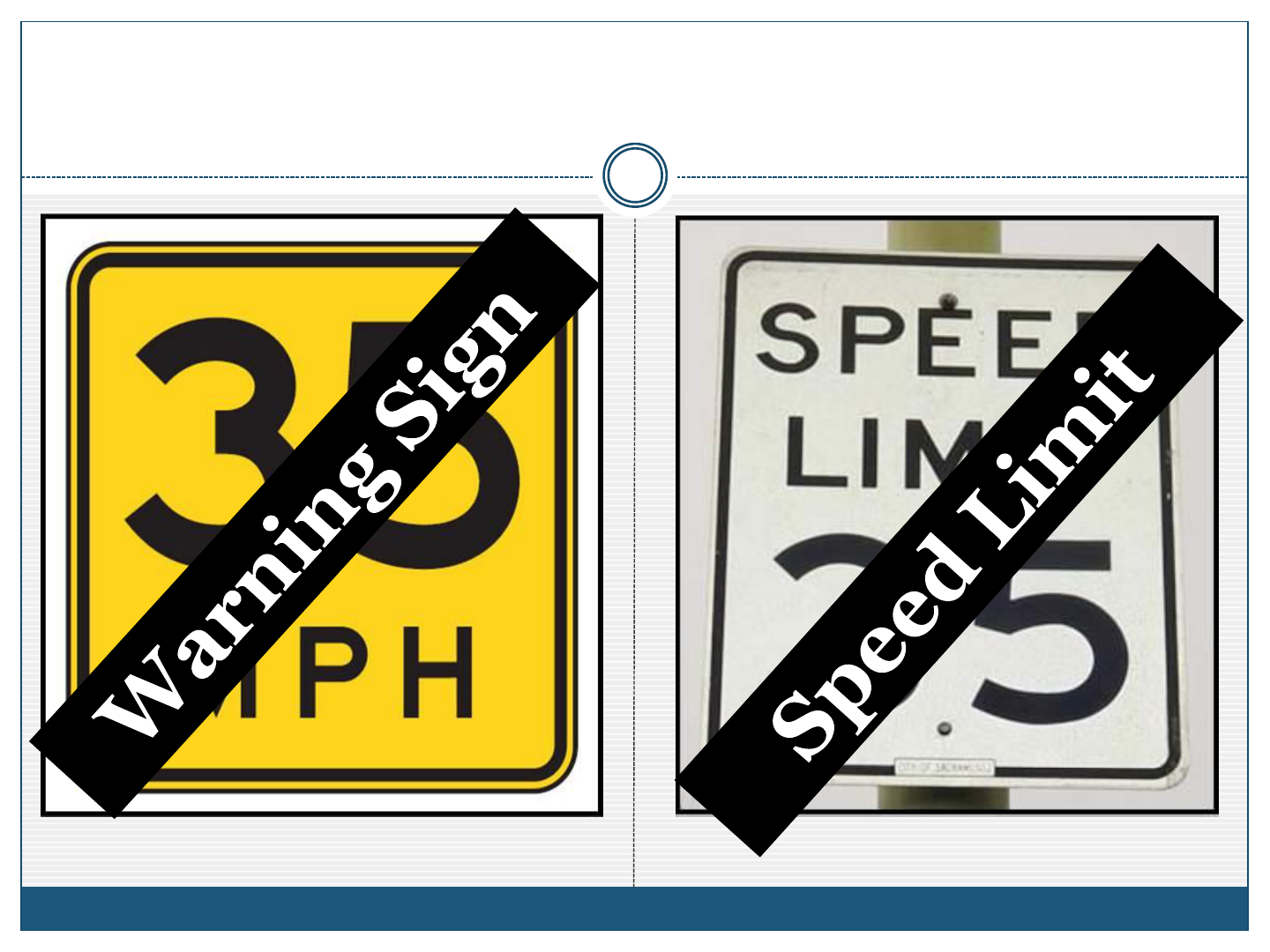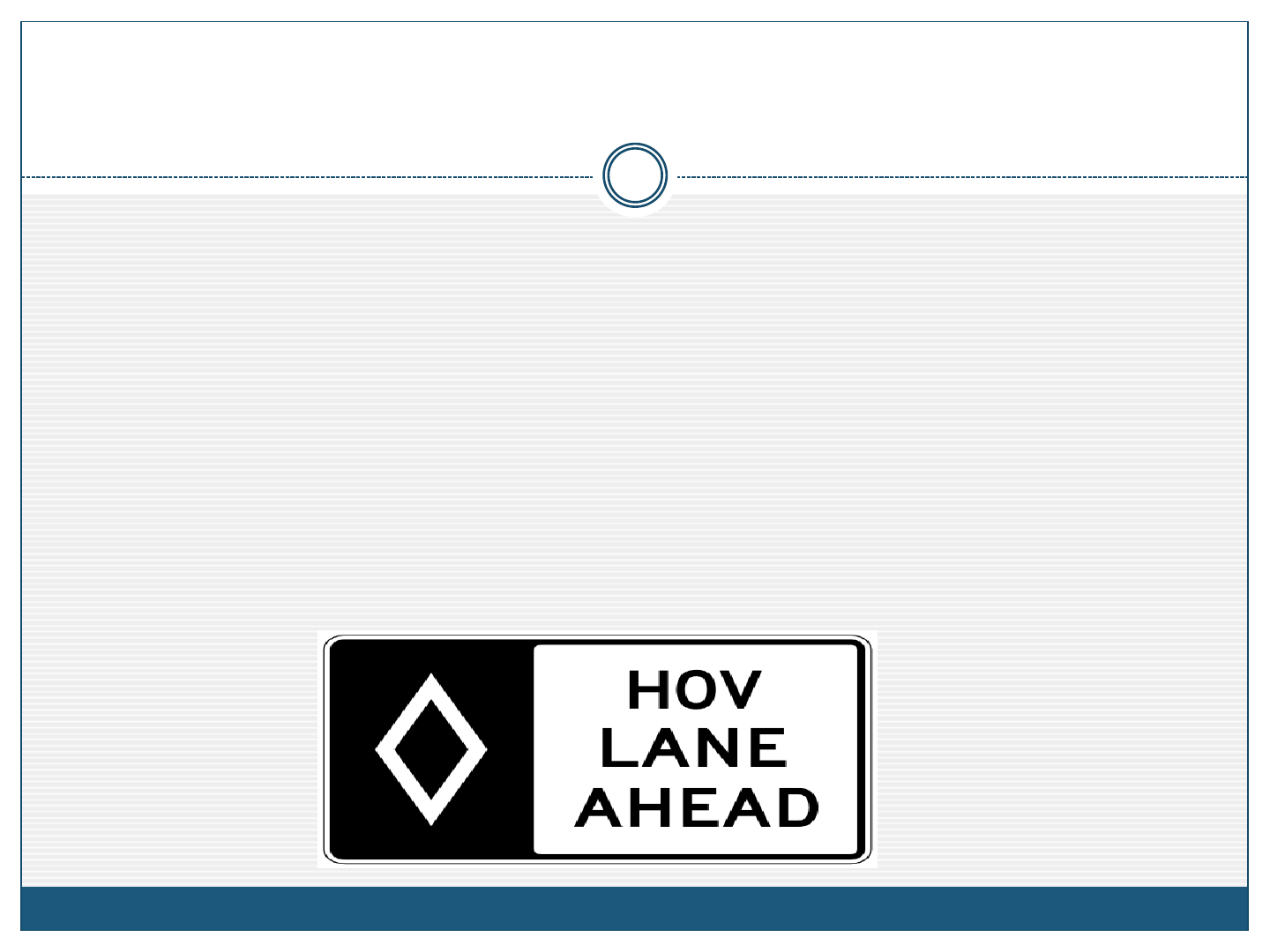
Unit Two
Language of the Road
Ver 7.1.17
1

What has millions of
miles & over
200,000,000 drivers and
vehicles?
Can a driver cross a
single solid white line?
Can a driver know if an
interstate road is going
North to South or East
to West?
What Do You Know About Signs, Signals, & Pavement Markings ?
What should a driver
do at a flashing red
signal?
What is black and white and
sometimes red all over?
Unit Two Objectives
Ver 7.1.17
2

• Student will be able to describe the laws for sharing the road safely with
emergency vehicles, school buses, pedestrians, motorcycles, and bicycles.
• Student will be able to define the concept of the Highway Transportation
System and evaluate what impact that concept has on safe driving.
• Students will be able to describe the function of signs, signals, and lane
markings and the potential consequences of not following those markings.
• Students will evaluate how traffic control devices impact safety including
right of way and risk and the impact of failing to obey the laws pertaining
to traffic control devices.
• Student will evaluate the risks of failing to adhere to signs and road
markings including the risks of speeding and distraction.
What Do You Know About Signs, Signals, & Pavement Markings ?
Unit Two Objectives
Ver 7.1.17
3

What Is The Highway Transportation System?
The system of roads, vehicles, and drivers that includes
EVERY person and EVERY vehicle and EVERY road at
any time in the United States.
Over
4,000,000
miles of
road
Ver 7.1.17
4
Over
250,000,00
0 vehicles

Highway Transportation System: Everyone On The Road At Anytime
Ver 7.1.17
5

What Is The Language Of The Road?
The “language of the road” is composed of:
Signs
Signals
Pavement Markings
Ver 7.1.17
6

Remove all the traffic lights, yellow lines,
one-way systems and road markings, and
let blissful anarchy prevail. I imagine it
would produce a kind of harmony.
- S A D I E J O N E S , E N G L I S H W R I T E R A N D N O V E L I S T , 1 9 6 7 -
C U R R E N T
Signs
But would it?
Ver 7.1.17
7

Guide Signs: Communicating Where You Are Going
Guide Signs can be RED, WHITE, & BLUE to indicate
Interstate numbers, BLACK AND WHITE to indicate US
routes and state roads, GREEN to indicate exits or mile markers,
BLUE to indicate motorists’ services, or BROWN to
indicate special points of interest.
Interstate system guide signs –
Any two digit interstate is a road that goes from one state to
another. Marked with blue shield shaped signs with a red
stripe.
Even numbers go from EAST to WEST.
Odd numbers go from NORTH to SOUTH.
Ver 7.1.17
8

On the interstate system, three digit numbers
with an EVEN first number are beltways going
around a city like:
On the interstate system, three digit numbers
with an ODD first number are spurs
connecting an interstate to another
community.
Guide Signs: Communicating Where You Are Going
Ver 7.1.17
9

Guide Signs: Communicating Where You Are Going
U.S. Routes - Black and White Shields on a Square Sign
US routes preceded the interstate system.
Many run through cities and towns.
Odd numbers generally run north – south.
Even numbers run east – west.
Maryland Routes – Usually black and white squares
Smaller routes maintained by local governments.
Might know them by street names rather than route numbers.
Ver 7.1.17
10

Guide Signs: Guiding You To Destinations And Services
Do you need food, fuel, or a
hotel?
Blue signs will tell you what
is available at an exit.
Do you want to go
somewhere?
Brown signs
indicate recreational
“stuff.”
Ver 7.1.17
12

Warning Signs: Real Risks
These signs tell a
driver a median is
upcoming; the
number of lanes is
changing; or traffic
is entering from a
different direction.
What are the possible hazards or risks around
these types of road changes?
Ver 7.1.17
13

Warning Signs: Real Risks
14
These signs warn a
driver of
intersections and
road crossings.
What are the possible hazards or risks around
these types of road changes?
Ver 7.1.17
14

Warning Signs: Real Risks
What are the possible hazards or risks around
these types of road changes?
These signs tell a driver the road is
changing direction or is becoming curvier.
Ver 7.1.17
15

Warning Signs: Real Risks
These signs alert a driver to specific issues
with road conditions.
Ver 7.1.17
16

Warning Signs: Real Risks
Construction Zones
Railroad Signs
Incident Signs
17
What are the risks
that go along with
these signs?
Ver 7.1.17
17

Warning Signs: Possible Risks
Ver 7.1.17
18

Regulatory Signs:
Regulate The Flow Of Traffic And Let Drivers Know The Law
Regulatory signs - signs with black, white or red
markings telling a driver what actions are legal
and illegal.
19
Ver 7.1.17
19

Regulatory signs - may have red circles with
lines through them to indicate what MAY
NOT do.
No right turn No U turn
Regulatory Signs:
Regulate The Flow Of Traffic And Let Drivers Know The Law
No left turn
Ver 7.1.17
20

Regulatory Signs :
Regulate The Flow Of Traffic And Let Drivers Know The Law
Regulatory Signs: Speed Limit Signs
Where would a driver find these posted speed limits?
Residential Suburban/
Urban/Rural
Roads
Suburban/
Urban/Rural
Roads
Highway/
Interstate
Interstate/
Expressway
Ver 7.1.17
21

Speeding: Fact Or Fiction
• You can go 10 miles over the speed limit, and you
won’t get stopped by a police officer.
• Every expressway has a speed lane where you can go
faster than the rest of the road.
• If you are passing another vehicle, you are allowed to
exceed the speed limit.
Ver 7.1.17
22

Speeding Facts
Ver 7.1.17
23

What’s The Difference Between These Two Signs?
Ver 7.1.17
24

When travelling on
a road marked 40
mph,
how fast can a
driver legally go?
Regulatory Signs:
Regulate The Flow Of Traffic And Let Drivers Know The Law
Ver 7.1.17
25
The speed limit is 55
mph. You observe
cars driving at 80
mph. How fast can
you go to keep pace
with traffic?

Speeding & Law Enforcement
Ver 7.1.17
26
VIDEO TO BE DISPLAYED
DURING CLASSROOM
INSTRUCTION.

Regulatory Signs:
Regulate The Flow Of Traffic And Let Drivers Know The Law
Do you know what this is, anywhere in the world?
Ver 7.1.17
27

So What Are You Supposed To Do At A Stop Sign?
Come to a complete stop!!!!
WHERE? Before your vehicle crosses the stop line, moves into the
crosswalk, or enters the intersection.
WHO? Yield to pedestrians, cyclists, any driver to your right, any
driver already in the intersection, any driver who got to the stop sign
before you.
HOW? Look to your right, then your left, and then your right again.
WHEN? When the intersection is clear and there is enough space in
any approaching traffic, you may proceed. Remember that all drivers
an at intersection MAY NOT BE REQUIRED TO STOP.
Ver 7.1.17
28

Where are you supposed to stop?
If all three cars arrived at the same time and
you are in CAR A, who goes first?
Does this car
still have to
stop at the stop
sign?
Ver 7.1.17
29
A
B
C

Regulatory Signs:
Regulate The Flow Of Traffic And Let Drivers Know The Law
Ver 7.1.17
30
VIDEO TO BE DISPLAYED
DURING CLASSROOM
INSTRUCTION.

Regulatory Signs:
Regulate The Flow Of Traffic And Let Drivers Know The Law
Yield Signs – What and How – Basic Overview
A yield sign means a driver should let other road
users go first.
Usually found when two roads cross or combine.
If you see a yield sign ahead, be prepared to let
other drivers crossing your road go ahead of you.
May have to stop if there is no gap.
And don't forget about bicycles and pedestrians.
You must always yield to them.
Ver 7.1.17
31

How To Yield
Ver 7.1.17
32
VIDEO TO BE DISPLAYED
DURING CLASSROOM
INSTRUCTION.

Signals
Ver 7.1.17
33

Traffic Signals
Ver 7.1.17
34

Flashing Signals
Flashing red – a
driver must stop
before entering the
intersection.
Flashing yellow – a
driver must slow
down and proceed
with caution when
going through the
intersection.
Ver 7.1.17
35

Signals
Directional Arrows
• A red arrow tells a driver that he/she may not
turn in the direction of the arrow.
• A yellow arrow tells a driver that he/she may
complete any turn when it is safe to do so but
should be prepared for the light to change.
• A green arrow tells a driver that he/she may turn
when it is safe to do so.
Ver 7.1.17
36

Intersections And Traffic Lights
Ver 7.1.17
37
VIDEO TO BE DISPLAYED
DURING CLASSROOM
INSTRUCTION.

Pavement Markings
Ver 7.1.17
38

Pavement Markings: Yellow
Separate traffic traveling in opposite directions.
Mark the left edge of the road on divided
highways, one way roads, and ramps.
May be
Single
Double
Solid
Dashed or broken
Ver 7.1.17
39

Pavement Markings: Yellow
Single yellow
line means the
driver may not
pass on either
side of the road.
Double
yellow lines
means the
driver may
not pass on
either side of
the road..
A yellow solid
and dashed line
together mean
the driver on the
side of the road
with the dash
may pass while
the other side
driver may not.
Dashed yellow line
means the driver
may pass on either
side of the road.
Ver 7.1.17
40

White lines can be
Single
Double
Solid
Dashed or broken
White lines are usually used:
To separate traffic traveling in the same direction.
To indicate where you must stop (stop line).
To mark the right edge of roadway.
Pavement Markings:
What Does A White Line Or Marking Mean?
Ver 7.1.17
41

Pavement Markings: White Road Markings
Separates lines of traffic
traveling in the same
direction. Crossing is not
recommended but is
allowed.
Indicates the
right side of the
road.
Ver 7.1.17
42

Pavement Markings:
What Does A White Line Or Marking Mean?
White pavement markings mark special lanes:
HOV (High Occupancy Vehicle)
Bike lanes
School or pedestrian crossing
Rail crossings
Extension of lane indicators into intersection
Ver 7.1.17
43

Pavement Markings: White
44
Bike
Lane
School
Zone
Railroad
Crossing
Stop Line
Separating
Traffic
Ver 7.1.17
44

Pavement Markings: Intersections & Expressways
In what directions would vehicles be
going?
Where would a driver be allowed to go?
What could a driver not do?
Ver 7.1.17
45

Pavement Markings: Intersections
What do these
lines indicate?
In what
directions can
these cars go?
Ver 7.1.17
46

Review for Unit Two
1) What is the difference between real risk and
possible risk?
2) What are some examples of regulatory signs?
3) What are some uses of white pavement markings?
4) What are some uses of yellow pavement markings?
5) Describe the process for stopping your vehicle?
6) What is the difference between a yellow speed sign
and a white and black one?
7) What are some of the common myths about speed
limits and speeding?
Ver 7.1.17
47

What’s next? Unit Three: Getting Started
Is there really such a thing as an emergency brake?
How do I make my vehicle fit me?
If I have an airbag, do I really need a seatbelt?
What do all the lights on my dashboard mean?
Ver 7.1.17
48

Ver 7.1.17
49
END OF UNIT TWO

